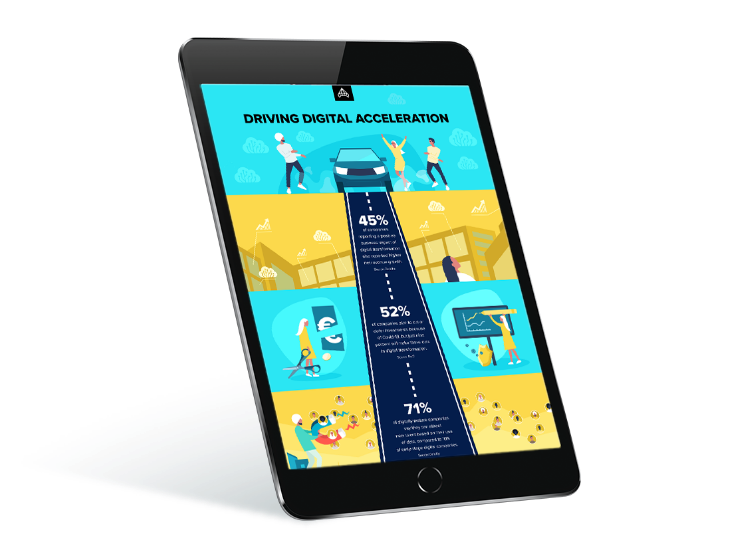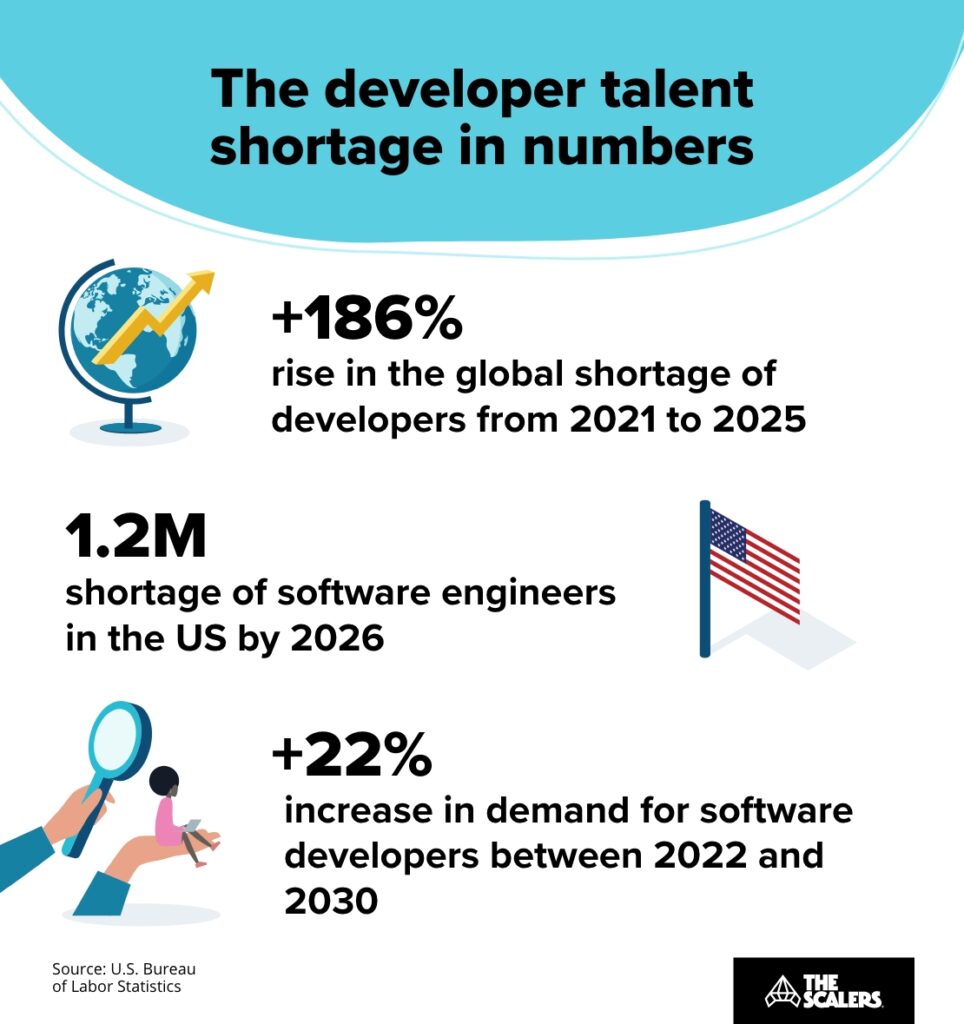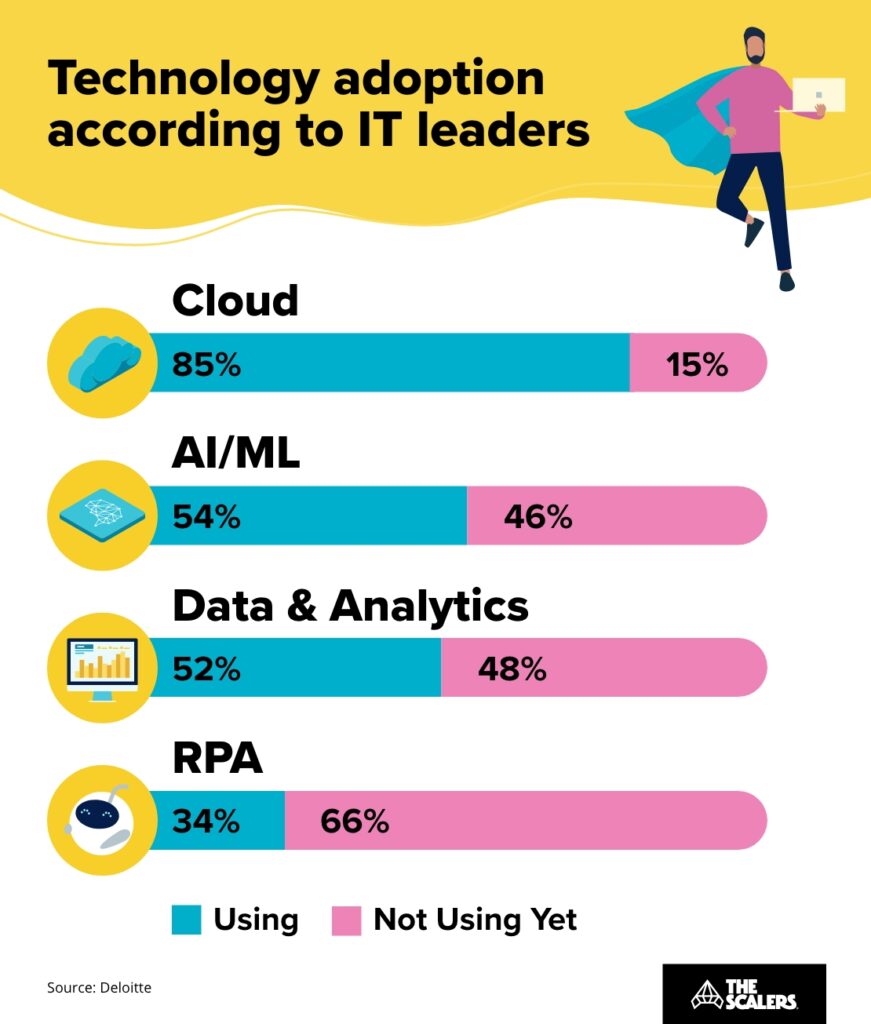Offshoring for digital transformation: 6 ways it reshapes businesses

Offshoring. It’s agile. It’s transformative.
And it can revolutionalise your business in today’s fourth industrial revolution.
In fact, 93% of organisations have adopted or are ready to adopt a digital-first business strategy to stay competitive. Most utilise offshoring for its cost-effectiveness and access to global talent expertise.
But that’s not all.
In this article, we’ll discuss offshoring for digital transformation and explore six key ways it can propel your business towards success.
These include:
- Enjoying greater scalability and flexibility
- Achieving cost optimisation and increased efficiency
- Accessing a global talent pool
- Accelerating round-the-clock operations and faster time to market
- Fostering knowledge transfer and skill development
- Cultivating innovation, creativity, and adaptability
Let’s dive into it!
Greater scalability and flexibility
The two words that best define the offshoring model are scalability and flexibility.
Why?
Let’s say you want to build a dedicated team of developers overseas to build and maintain software for your company. You find a reliable offshore partner that hires and onboards talent for you, and you agree to set up a team of five engineers.
After a few months, your business grows. You want to launch new products for your customers and decide to hire six additional engineers.
Thanks to offshoring, a process that your organisation may take half a year to complete can be solved in weeks.
An excellent offshore development company will search for the best tech talent available and provide you with top engineers whenever you need to expand your team.

Don’t get left behind in the shift to digital business
DOWNLOAD INFOGRAPHICCost optimisation and increased efficiency
Value for money.
That’s what you get when you leverage offshoring.
For instance, the average hourly rate of an Indian developer is €28/h, while a US engineer earns up to €65/h.
And it’s not only about money, but quality.
Developers in countries like India or Poland are known for their high commitment and business cultural alignment contrary to their US or Western European counterparts. If you’re a CEO, CTO or tech leader, you’ll know how valuable these attributes are.
When your offshore team is aligned with your organisation’s mission and vision, the results speak for themselves. Despite the geographical distance and time zone differences, offshore developers bring increased efficiency and unparalleled technical expertise.
See Google and Microsoft.
These tech giants have Research and Development Centers (R&D Centers) in Bangalore, India. Each office is home to thousands of engineers who help these enterprises thrive in the digital world and future-proof their businesses.
But you don’t have to be a large corporation to benefit from offshoring. Given the cost-effectiveness of this model, you can start building a team of highly skilled engineers within a budget that suits your needs.

Limitless access to a global talent pool
Do you struggle to find top talent in your region to keep up with the demands of digitalisation?
Don’t worry. You’re not alone. According to Gartner, 64% of executives see the tech talent shortage as their biggest barrier to adopting emerging technologies.

Increase innovation and deliver at speed in the Silicon Valley of Asia
LEARN MOREWith offshoring, finding the right talent to meet your business goals is easier than ever. There are no limitations to where you can hire elite tech professionals: the world is your talent pool.
In countries like India, where 1.5 million engineers graduate yearly, you can search for skilled developers with high English proficiency and specialised in niche programming languages.
Eastern Europe and Latin America are also up-and-coming tech hubs, with countries like Romania and Colombia producing qualified engineers with experience working with international firms.

Round-the-clock operations and faster time to market
Some tech leaders see time zone differences with their offshore teams as an obstacle. Others view it as a competitive advantage.
If you embrace offshoring for digital transformation, time and geographical distances aren’t an issue for your business. Instead, these become crucial for your organisation’s global expansion and productivity.
Having offshore teams in different time zones allows your company to operate round-the-clock. Once your US or UK-based team stops working for the day, your offshore developers in Asia or Eastern Europe are about to start their work day.
The result? International outreach, the ability to complete projects in less time and release products faster.
Knowledge transfer and skill development
When offshoring, close collaboration is a must: it brings more ideas and fresh perspectives to businesses.
Imagine you hire a junior developer for your organisation in Australia. He’s a recent graduate with an ambition to grow and learn but little to no experience working with an international development team.
Next, you onboard three senior offshore Indian developers. Indian engineers are recognised for their resilience and capacity to collaborate across teams, so you introduce them to the junior Australian developer.
Thanks to their deep expertise, your offshore engineers cultivate an innovative approach to problem-solving for the young developer, who goes from junior to mid-level developer in record time.
At the same time, Indian engineers learn about the Australian market’s unique perspectives and market trends, which help collaborate with local partners.
Bingo. You just unlocked the potential of working in a cross-cultural workplace, a recipe for navigating digital transformation and seizing the opportunities it brings.

How we helped a Legal SaaS company scale its Ruby on Rails team to deliver a groundbreaking product
DOWNLOAD CASE STUDYEnhanced innovation, creativity, and adaptability
“More profound than fire or electricity”.
These are Sundar Pichai’s words on the impact AI will have on people’s lives in the near future. The Google CEOs’ opinions are related to offshoring, especially when discussing innovation and creativity.
Indeed, innovators and creative minds will succeed in a tech world undergoing unprecedented changes, with tech corporations like IBM replacing nearly 8,000 jobs with AI.
While this may raise concerns about job security to some, it opens up a window of opportunity for tech leaders who want to offshore software development.
For every role filled with an AI algorithm, a talented offshore developer is waiting for a chance to shine. These engineers specialise in AI and other technologies such as cloud, data analytics and robotic process automation (RPA).
And what’s more important: these are out-of-the-box thinkers who represent the tech industry’s future.

In summary
In today’s ever-changing digital landscape, if you blink, you risk falling behind your competitors.
And that’s something you can’t afford to happen.
Offshoring for digital transformation is essential for your business to future-proof itself and successfully navigate the turbulent waters of the tech industry.

If you enjoyed this article about offshoring for digital transformation, you might consider scaling up your tech team with offshore developers. Let’s talk about your business needs and start building your team today!















